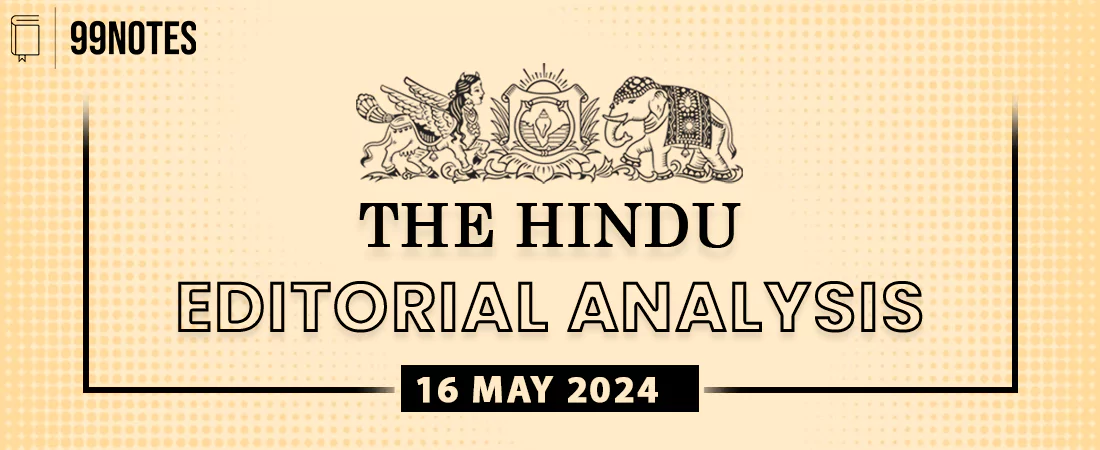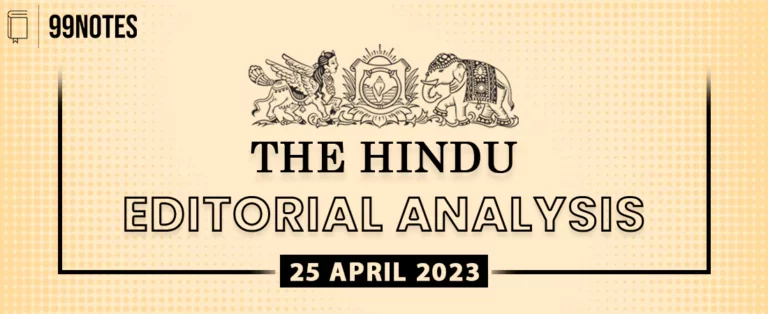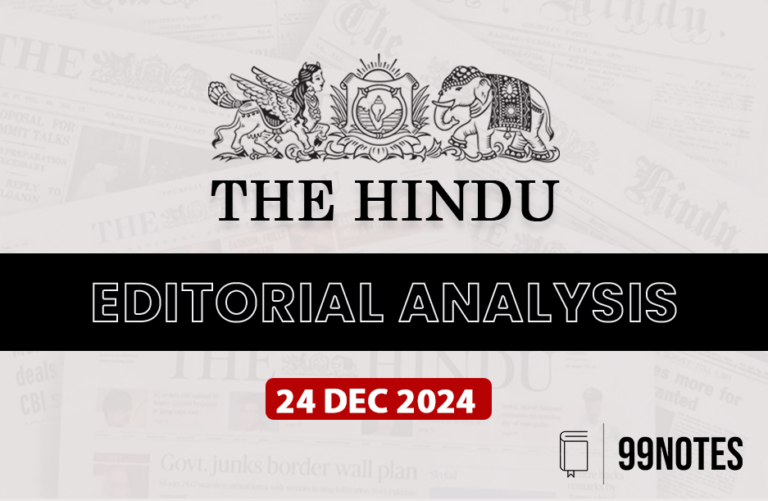16 May 2024 : The Hindu Editorial Notes PDF
1. Social media’s impact on Indian politics
| Topic: GS1 – Indian Society – Effects of globalisation on Indian society
GS2 – Indian Polity. |
| Context |
| ● The article delves into the rise of social media influencers like Dhruv Rathee and Ravish on YouTube is reshaping political narratives in India.
● Traditional media’s shift towards provocative content has prompted disillusionment, leading to increased reliance on social media for diverse viewpoints and political engagement ahead of the 2024 elections. |
Rise of Social Media in Indian Elections:
- Social media influencers like Dhruv Rathee and Ravish on YouTube have gained significant influence, impacting political narratives and potentially influencing election outcomes.
- Traditional media, previously aligned with the ruling party, has shifted towards provocative content, prompting disillusionment and the search for alternate viewpoints among the populace.
Changing Landscape of Social Media:
- Initially, social media was dominated by right-wing voices, creating cognitive dissonance with traditional media narratives.
- However, as traditional media adopted similar content, critical voices gained credibility, providing diverse viewpoints to the public.
- Algorithms on platforms like YouTube and Facebook further amplify the reach of dissenting voices, challenging the dominance of traditional media.
Impact on Political Engagement:
- Social media provides a platform for politically reticent individuals to engage with alternative viewpoints, facilitating political discourse in environments of fear.
- Educated youth, once a core support base for the ruling party, are increasingly frustrated with the lack of opportunities, leading to a shift in political allegiance fueled by narratives from social media.
Implications for Political Dynamics:
- Social media’s role in shaping political narratives outside formal party structures diminishes the influence of traditional political intermediaries.
- This centralization of narrative shaping by political leaders may deepen polarisation and reshape party structures, impacting the public sphere.
- The decline of traditional media’s credibility raises concerns about the quality of political discourse and the health of Indian democracy, warranting further investigation.
Conclusion:
- The emergence of social media as a key player in Indian elections signifies a shift in political communication and engagement.
- While providing space for diverse viewpoints and democratic reclaiming, it also raises questions about the centralization of political narratives and the erosion of traditional media’s credibility.
- The implications of this shift on political dynamics and the public sphere require careful consideration as India approaches the 2024 elections.
| Potential Impact of Social Media On Election Process: |
| Pros of Social Media on Election Process:
● Increased Voter Engagement: Social media platforms provide opportunities for political parties and candidates to engage directly with voters, encouraging participation and awareness. ● Wider Reach: Social media enables political campaigns to reach a broader audience, including young voters and those in remote areas, enhancing political communication and outreach. ● Transparency: Real-time updates and information sharing on social media promote transparency in the electoral process, allowing voters to access news and updates easily. ● Cost-Effective Campaigning: Social media campaigns are often more cost-effective than traditional advertising methods, levelling the playing field for candidates with limited resources. ● Political Discourse: Social media facilitates political discourse and debate, allowing citizens to discuss issues, share opinions, and participate in democratic dialogue. Cons of Social Media on Election Process: ● Spread of Misinformation: Social media can be a breeding ground for the spread of fake news, rumours, and misinformation, influencing voter perceptions and decision-making. ● Polarisation: Echo chambers and filter bubbles on social media platforms can reinforce existing biases and polarise political discourse, leading to increased divisiveness. ● Manipulation: Social media can be exploited for political manipulation, including the spread of propaganda, disinformation campaigns, and foreign interference. ● Privacy Concerns: The collection and use of personal data on social media raise privacy concerns, particularly regarding targeted advertising and micro-targeting of voters. ● Digital Divide: Not all citizens have equal access to social media platforms, creating a digital divide that may exclude certain demographics from participating fully in the electoral process. |
| PYQ: Use of Internet and social media by non-state actors for subversive activities is a major concern. How have these have misused in the recent past? Suggest effective guidelines to curb the above threat. (200 words/12.5m) (UPSC CSE (M) GS-3 2016) |
| Practice Question: How has the rise of social media influencers impacted political narratives in India, particularly in the context of shifting dynamics with traditional media? Discuss the implications of this trend on political engagement and democratic discourse. (250 Words /15 marks) |
2. The case for election day as a holiday
| Topic: GS2 – Indian Polity. |
| Context |
| ● The debate over whether employers, especially Small and Medium-sized Enterprises (SMEs), should declare a holiday on election day in India has sparked discussions on the balance between civic responsibility and personal freedoms.
● Article seeks to draw comparisons with global practices and proposes innovative solutions to encourage voter participation. |
Introduction
- The right to vote in India is not just a privilege but a constitutional right outlined in the Constitution.
- Many democracies worldwide provide a holiday on election day to facilitate voter participation.
Debate on Employer Obligations
- Recent discussions revolve around whether employers, especially SMEs, should declare a holiday on election day.
- Some argue for this practice, citing constitutional principles, while others question its necessity and potential infringement on individual liberties.
Global Practices
- Some countries like Australia mandate voting and provide a holiday, while others, like the United States, don’t.
- A study from Princeton University suggests that having an election holiday doesn’t significantly increase voter turnout.
Balance between Civic Responsibility and Personal Freedoms
- Advocates argue that the Constitution upholds voting as a right, hence employers should grant a day off.
- Business organisations like FICCI, ASSOCHAM, and NASSCOM are expected to align with societal goals.
- The counterargument emphasises individual freedom and the principles of a free market economy.
- Mandating a holiday may be seen as an infringement on employer autonomy, especially for smaller businesses.
Comparative Analysis with the U.S.
- In the U.S., election day isn’t a national holiday, and individuals manage their schedules to vote.
- Some states offer paid time off to vote, but it’s not universally mandated at the federal level.
Recommendations for India
- The proposal to link paid leave to proof of voting suggests a middle ground.
- This incentivizes voter turnout while allowing employer discretion, addressing both civic engagement and business concerns.
Perspective
- The issue transcends legalities and delves into democracy’s essence, fostering civic engagement while respecting diverse needs.
- Policymakers should explore innovative solutions to encourage voting without burdening employers.
- Future technological advancements may enable voting from home without undue influence.
Conclusion
- The debate on employer obligations on election day is nuanced, touching upon democracy, individual freedoms, and economic realities.
- Striking a balance between civic obligations and business autonomy is essential for upholding India’s democratic ethos.
- Flexible solutions can accommodate the dynamic needs of society while promoting voter participation.
| Practice Question: Discuss the nuances surrounding the debate on whether employers should be obligated to declare a holiday on election day in India, considering the balance between civic responsibility and personal freedoms, with reference to global practices and innovative solutions. (150 Words /10 marks) |




